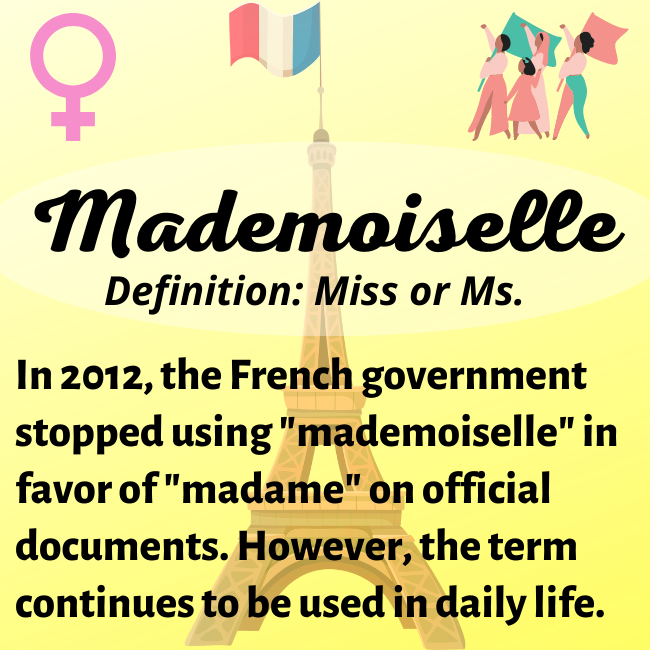Madame vs. mademoiselle: Which one to choose
Madame or Mademoiselle? Every French learner has encountered this question when wondering how to address a woman in France. Meaning “Miss,” Mademoiselle is used to address unmarried women while Madame, meaning “Mrs.,” is used to address married women.

But, like any language, French is always evolving. French slang is one way new words appear in the language, but there are times when old words fall out of style. And mademoiselle is a perfect example of that.
Today in France, many people no longer use the word, mademoiselle. Starting in the13th century, the French used mademoiselle to refer to young unmarried women. Usually used to address a woman of higher status, the title, mademoiselle, might have even been coveted by French women at some point in time.
But now, most consider the title out of date and even sexist. Since a woman’s status is no longer dependent on whether she is married or not, the French government and its people decided to get rid of it all together.

Madame or Mademoiselle?
So to really answer your question: Madame or Mademoiselle? The answer is always madame.
Even though feminists were calling to stop the use of mademoiselle for a few decades, the French government finally stopped using the title on official documents, letters, and other administrative forms in 2012.
And although the older populations are still getting used to this change, you’ll rarely hear mademoiselle from the French nowadays. In fact, using it might even get you in trouble.

Why There’s No Discussion on Whether It’s Madame or Mademoiselle
One time I had a teacher in a school in France who insisted on calling us girls (who were all around the age of 18 to 20), Mademoiselles. And as an American with less of a sense of the meaning of the word it didn’t really bother me.
But there was a French girl who eventually had enough and lost it on our teacher. She explained to him how French speakers don’t use the word anymore because it’s unnecessary to address a woman based on a fact as trivial as her marital status.
He pushed back trying to explain that it didn’t really matter and that the French have been using the term for centuries. But my classmate wouldn’t back down. Men, she explained, aren’t addressed based on whether they’re married or not so why should women?
Madame Compared to Monsieur
French men are all referred to as Monsieur whether they’re 55 and unmarried or 18 and married. Eventually, the teacher backed down. You could tell he didn’t completely understand why it was such a big deal, but I certainly did.
It’s true that there was a time in our society when we treated (and addressed) women differently based on their marital status. But nowadays, marriage is no longer a requirement for women and they go on to live very fulfilled lives without getting married so their marital status shouldn’t matter.
How to address a Young Girl in French
After all this, you might be wondering how to address a really young girl. Surely, the French don’t go around calling five-year-olds madame. (They don’t.) If you want to refer to a really young girl you can call her jeune fille, which means young girl.
Other options include fillete, which means little girl, or simply petit or tout petit. Petit is a little more casual, but since it doesn’t change depending on the gender of the child so you can use it for both little boys and girls.
Madame or Mademoiselle Overview
Overall, if you’re learning how to speak French, I would steer clear from using mademoiselle. It’s possible you’ll hear older generations using the word, but mademoiselle is certainly out of date and out of fashion.
Become an expert in French etiquette
Understanding and mastering French cultural etiquette is not easy! One of of the most important aspects to French politeness is mastering how to say “you”. This article on our site addresses “tu” vs. “vous” in great detail. Separately, Camille, our good friend at Frenchtoday.com, does a great job addressing the question of madame vs. mademoiselle in detail. Finally,
